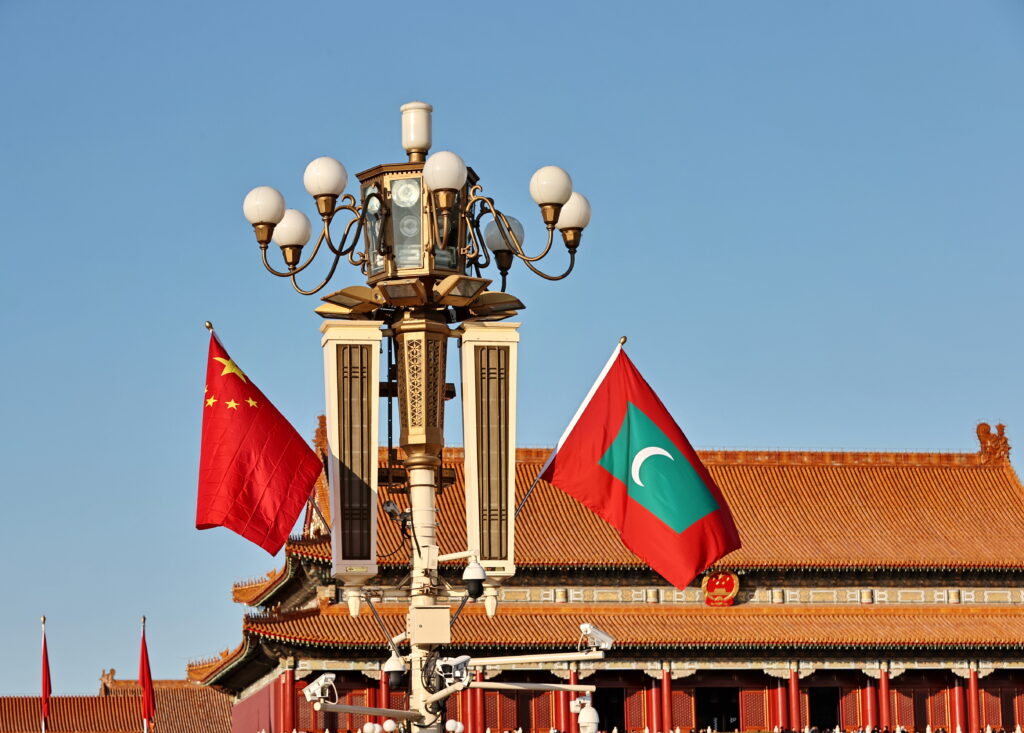The relationship between Male and New Delhi has experienced a downturn since Maldivian President Mohamed Muizzu won the 2023 election. In January 2024, the Maldives and China signed a series of bilateral agreements on infrastructure, energy, maritime and agriculture cooperation during Muizzu’s visit to Beijing. The relationship was further deepened in March 2024 as the Maldives and China entered into two defence agreements, with China committing to providing military assistance.
These agreements do not necessarily indicate Chinese intent to alter the regional security balance and the triangular relations between China, the Maldives and India. But they have raised concerns, especially in India. Given the Maldives’ status as a small state with limited resources, the motivation behind seeking military aid from China could stem from factors such as national defence, maritime security and disaster response.
China’s assistance may be perceived as a means to bolster the Maldives’ military capabilities rather than a deliberate move to alter regional dynamics. But military collaboration could be part of China’s broader strategy to leverage power and diminish India’s sphere of influence over South Asian countries.
India has also started to withdraw its military forces stationed in the Maldives at the request of Muizzu. At the same time, China’s presence in the Maldives has steadily increased, as evidenced by significant infrastructure initiatives, including the China–Maldives Friendship Bridge, valued at US$200 million. China’s influence is further substantiated by the permission given to Chinese ocean research vessel, Xiang Yang Hong 03, to dock at a Maldives port.
India is concurrently strengthening its naval forces on the strategically crucial Lakshadweep islands, positioned approximately 130 kilometres north of the Maldives. The Indian Navy has revealed plans to enhance ‘monitoring activities’ in the region by deploying a naval unit stationed on Minicoy Island.
In March 2024, the Indian Navy announced the reinforcement of its presence on strategically vital islands near the Maldives. The newly commissioned INS Jatayu, which became operational on 6 March, is situated in India’s Lakshadweep archipelago and is designed to function as an independent maritime unit. This strategic move demonstrates that India is enhancing its naval capabilities to maintain a vigilant posture and pre-empt potential threats in the region.
The Maldives is a pivotal part of China’s ‘String of Pearls’ grand strategy. This strategic concept involves China’s efforts to expand its influence through a network of naval bases and commercial ports encircling vital maritime routes.
The Maldives is strategically located only 700 kilometres from the Lakshadweep archipelago and 1200 kilometres from the Indian mainland. China’s growing influence in the Maldives raises significant security concerns given its proximity to India. There is a prevailing perception that the world has underestimated the implications of China’s rapid military modernisation and maritime expansion in the Indian Ocean region. China’s global naval power transformation has led to a willingness to counterbalance US interests in the West Pacific and Indian interests in the Indian Ocean.
Beijing’s growing influence in the Indian Ocean and its ambitious Belt and Road Initiative could see China potentially adopt a military posture in the region. These trends hold immense significance for India as China’s activities may restrict operational space and decrease India’s conventional leverage with smaller regional states. Adding to military pressure along the Himalayan border, the possibility of China establishing a naval base on one of the Maldivian islands could open a maritime front against India, marking a milestone in China’s strategic encirclement of its neighbour.
The Maldives has emerged as a critical node in China’s strategic ambitions. The recent defence pacts and collaboration between the Maldives and China underline a growing alignment that could strengthen China’s position in the Indian Ocean. As part of the ‘String of Pearls’, the Maldives could enhance China’s maritime capabilities and presence despite its historical context within India’s sphere of influence.
Rather than questioning China’s motives, India should prioritise adapting to the inevitable consequences of Chinese influence in the Indian Ocean. China’s maritime activities stem from diverse factors such as resource and commercial interests, diplomatic considerations, military and security concerns and heavy reliance on Middle Eastern and African resources. Through its expansion from the East Sea to the Indian Ocean, China aims to undermine the unity and strength of India’s regional alliances. In securing energy routes through these locations, China has broadened its trade and diplomatic relations with various countries, including the Maldives.
India should seek to strengthen its relationship with the Maldives and mitigate China’s influence by prioritising diplomatic engagement, economic cooperation and security partnerships. Strengthening defence cooperation with crucial security partners like Japan, the United States, Australia and ASEAN countries is also critical for India to maintain a proactive stance, safeguard its national interests and limit regional security threats.
Tran My Hai Loc is Deputy Head of the Department of Diplomatic Politics in the Faculty of International Relations, Ho Chi Minh City University of Foreign Languages and Information Technology (HUFLIT). He is a PhD Student at the University of Social Sciences and Humanities – VNU Hanoi.

